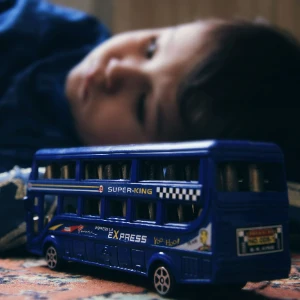The Psychological Effects of Being an Illegitimate Child - Low self-esteem, trust issues, identity problems, relationship challenges...
Updated on 3rd February, 2023
Growing up as an illegitimate child can be a difficult experience that can have a profound impact on one's emotional and psychological welfare. The stigma and humiliation attached to being born outside of marriage, despite the fact that it may appear little, can have long-lasting effects that can even affect adults. The top five psychological effects of being an illegitimate child will be discussed in this article.
Low Sense of Self-Esteem
Low self-esteem is a devastating consequence of being an illegitimate child. Being born outside of marriage stigmatises a child for life, and this stigma can make them feel inferior to their peers since they are frequently the target of mockery and judgement. It could be harder for them to succeed in life if they have a bad self-image as a result. A lack of drive and a sense of pessimism can occasionally accompany poor self-esteem, which can exacerbate people's feelings of inadequacy.
Low self-esteem can also have a lasting impact on an individual's future relationships and career. Children who grow up with low self-esteem may struggle to assert themselves and form healthy relationships, making it more challenging for them to establish a supportive network of friends and family. n childhood, it can make it difficult for a child to speak up for themselves and develop good connections, which makes it harder for the child to build a strong social support system among friends and family. This may result in a lack of confidence, which might obstruct success at work.
It's crucial for families and communities to support children who are struggling with low self-esteem. Encouragement and positive reinforcement can help build their self-esteem and give them the confidence they need to succeed. Providing opportunities for children to develop their skills and interests can also help build their self-esteem and give them a sense of purpose and fulfillment.
Children who are battling the repercussions of being an illegitimate child may find it helpful to address poor self-esteem via therapy and counselling. Developing a healthy self-image, overcoming feelings of inadequacy, and gaining confidence in oneself could all be achieved by youngsters with the help of a therapist. Illegitimate children who have been raised can overcome their struggles with low self-esteem and have happy lives with the correct encouragement and empathy.

Issues With Identity
A key psychological impact of being an illegitimate child is losing one's sense of self-identity. Establishing a sense of identity and purpose may be challenging for children who do not have a strong awareness of their family history and lineage. This can have a serious influence on their psychological health by leading to emotions of perplexity, uneasiness, and uncertainty.
Growing up as an illegitimate child can sometimes make it difficult for a child to establish a close bond with their parents. Children may experience a loss of kinship and feeling of ties without a common family history and ancestry. They could find it difficult to be secure in their own identity as a result, and this might make them feel empty and lonely.
Giving kids the chance to learn about their family history and background is crucial for helping them deal with the feelings of identity loss. This may entail finding out about their ancestors, getting in touch with other family members, and establishing connections with their cultural heritage. In addition, therapy and counselling may be a helpful tool for assisting kids in accepting who they are and understanding their role in the world.
It is also important for families and communities to recognize and address the effects of lost identity on children who are struggling with the psychological impact of being an illegitimate child. Families and communities may assist children in forming a solid sense of identity and overcoming the difficulties associated with being born outside of marriage by offering them support, understanding, and a secure environment in which to express their feelings.
The Struggles With Trust
Being an illegitimate child often results in trust issues, which may be quite detrimental. Without a consistent and loving home environment, children may find it difficult to develop meaningful relationships and gain trust in others. They may feel detached, fear, and insecurity as a result, which could have a long-lasting effect on their emotional health.
Illegitimate children can have trouble trusting their own decisions and instincts as they get older. It may be difficult for them to thrive in life if they develop indecision and a lack of confidence as a consequence.

Support and understanding from families, communities, and professionals is crucial for youngsters to overcome trust difficulties. Providing a secure setting, offering emotional support, and assisting kids in forming positive interpersonal interactions are some examples of how this can be accomplished. When children are coping with the psychological effects of being an illegitimate child, therapy and counselling may be a very helpful tool for managing trust difficulties. Children who struggle with trust difficulties can work with a therapist to identify their underlying causes, create positive coping strategies, and acquire the emotional intelligence necessary to create lasting connections.
Maintaining an awareness of the trust issues that children may have as they mature into young adults is also crucial for families and communities.
Issues With Mental Health
Mental health struggles are a common and serious psychological effect of being an illegitimate child. Mental health conditions including depression, anxiety, and post-traumatic stress disorder may be more likely to develop in children who are raised in a challenging home setting or who endure a great deal of emotional stress (PTSD). Illegitimate children can have a hard time adjusting to the prejudice and stigma they may experience in society. This may cause them to experience emotions of remorse, and humiliation, which could have a long-term impact on their mental health.
Children need proper assistance and care to overcome mental health challenges. This can include access to support groups, therapy, and counselling, as well as other tools that can assist kids in managing their symptoms and enhancing their wellness.
Families and communities can play a critical role in supporting children who are struggling with the psychological effects of being an illegitimate child. This can include providing emotional support, creating a safe and stable environment, and helping children to build healthy relationships with others.
It is very important for society to acknowledge and address the mental health struggles that children who are born out of wedlock may face.

Difficulty With Relationships
For those who grow up as illegitimate children, relationships can be extremely difficult. Relationships on a personal and professional level may suffer as a result of the psychological effects of being an illegitimate child.
For instance, those who have trust difficulties or poor self-esteem as children may find it difficult to build constructive relationships. It may be difficult for individuals to create and maintain good connections with other people as a consequence of their emotions of loneliness, dread, and insecurity.
A lack of a stable and nurturing home setting may also make it difficult for those who grow up as illegitimate children to negotiate the complexity of relationships. This may make it difficult for them to develop and sustain lasting relationships with other people as well as cause them to have difficulty understanding and expressing their feelings.
People who are raised as illegitimate children may find it helpful to have assistance and advice from dependable friends, family members, or therapists in order to overcome these difficulties. This can enhance their general emotional and psychological wellbeing and assist them in creating good coping skills, solidifying supportive relationships, and developing strong healthy habits.
It is also important for individuals who grow up as illegitimate children to be patient and understanding with themselves as they work to build healthy relationships. By taking the time to understand their own emotions and needs, and by seeking out supportive and understanding relationships, individuals can overcome the challenges of relationships and build a fulfilling and meaningful life.
Conclusion on the Psychological Effects of Being an Illegitimate Child
It is important to remember that these effects are not permanent and that with support and understanding, individuals can overcome the challenges associated with being an illegitimate child. Regardless of their home situation, children who have a supportive family and community can grow up to have healthy connections and a solid sense of self. Additionally, therapy and counselling can be beneficial in coping with the psychological effects of being an illegitimate child.
In conclusion, having an illegitimate kid can significantly affect one's emotional and psychological welfare. It's critical to recognise the difficulties brought on by this experience and to offer assistance and compassion to individuals who are having a hard time. By overcoming these obstacles, people may create genuine connections, and live happy and meaningful lives. Being born out of wedlock does not define who you are, but it does shape your journey. Embrace the challenges and find the strength to grow into the person you are meant to be.
A Beautiful Quote
- George Santayana, Philosopher, essayist, poet, and novelist